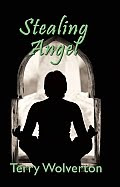what i read in july
 Last month felt like a big reading comeback. Books are great! (Even though I have resumed neither the sound nor the fury.)
Last month felt like a big reading comeback. Books are great! (Even though I have resumed neither the sound nor the fury.)Stealing Angel by Terry Wolverton: Even most indie bookstores don't have a shelf for "spiritual thrillers," but if they did, Wolverton's newest novel would no doubt be facing forward with one of those "staff recommends" cards beneath it (at least if I was on staff). I devoured this book--about a woman who kidnaps the daughter she's raised with her ex, the girl's bio mom, to protect her from abuse--in two and a half days. As Maggie and Angel travel through Mexico, Maggie struggles to square her actions with her spiritual practice, something Eastern and yoga-like that the locals find cultish. The question seems to be: How do you maintain agency in your life without being a control freak? It's something I've been thinking about a lot lately, and even though I'm still not sure about some of the novel's apparent conclusions (for example, that it's better to be calm than emotive), I was moved and riveted by Maggie's journey.
The Anxiety of Everyday Objects by Aurelie Sheehan: This is a novel about a 29-year-old, single, middle-class woman trying to navigate romance, career and creativity in the big city. But while that might be a formula for chick lit, with all its derogatory associations, Sheehan's novel has a subtle Aimee Bender-esque undercurrent of surreality. There's the protagonist's mysterious blind coworker, snippets of newspaper articles about magical bees and other oddities, and just a general sense that this world is adjacent to our own but *not* our own. Sheehan also has a flair for small, poetically human moments which make a good case for 29-year-old, single, middle-class women having more than visions of wedding dresses dancing in their heads.
City of Thieves by David Benioff: Ten out of ten people in my book club liked this novel: Structurally it's an action movie, right down to improbable scenes of our scrappy hero wrestling a gun from Nazi hands. But the scrappy hero himself, a young Russian Jew named Lev, acknowledges this, and Benioff's thoughtful, literary writing never glorifies war. Torture, cannibalism and acts of cowardice are all presented matter-of-factly, and Lev and his friends get through it because they have no other choice. Although Vika, Lev's girl-soldier love interest, says that winning for Mother Russia is the only thing that matters, Lev points out that they are Russia and therefore worth saving. An individualistic and American worldview, but also a tender and life-affirming one. I kept thinking about the serious post-traumatic stress all of these characters must have experienced later in life. Sometimes I think anyone who lives through a war and doesn't spend the rest of his life screaming on a street corner is a hero. And maybe those who do are too.
Limitations by Scott Turow: Scott Turow always gets billed as one of those "literary" genre writers, which somehow seems insulting to everyone involved, as if plotting and pretty writing are mutually exclusive skills, as if readers shouldn't hunger for both. Anyway, yes, this is a legal procedural about a judge trying a rape case and avoiding a threatening stalker. It's also a character study of a middle-aged man reflecting on his privileges and past misdeeds. It's fairly effective as both, painting the legal system and humans themselves as the limited entities the title implies. But (perhaps a mark against hybridity?) the book was neither a total page turner nor an intricate examination of humanity. Eventually the stalker spills his (or her) guts in traditional TV-villain style, and I found myself simultaneously thinking that I wanted to know more about this character and also that (s)he was unveiled too quickly.



Comments